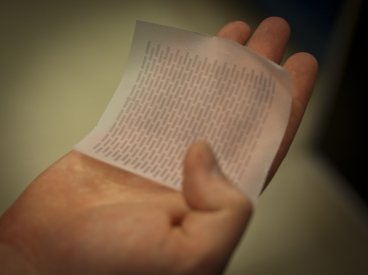 |
The picture shows the researchers showing this kind of flexible, collapsible paper solar cell. (Source: Patrick Gillooly)

The picture shows a battery sample with only one layer of conductive material deposited. (Source: Patrick Gillooly)
Scientists at the Massachusetts Institute of Technology (MIT) have recently developed a new printing technology and have successfully used it to make paper solar cells. The research report was published in "Advanced Materials" on July 8.
At present, the required conditions for the manufacture of solar cells are destructive - the printed substrate must be immersed in liquid or require high temperatures. The new printing technology only requires steam and ambient temperature not exceeding 120°C. In this way, untreated plain paper, clothes and plastics can be used as battery manufacturing materials.
In addition, this technology only uses a very simple method - vapor deposition method, the method is cheap, commercial applications.
However, compared to ordinary paper printing, this technology is slightly more complicated: five layers of conductive material are repeatedly deposited on the same position of a piece of paper by using a paper-like mask to fix the pattern on the surface of the battery. The entire process must be carried out in a vacuum.
In addition to paper cells, the researchers also used PET (polyethylene terephthalate) plastic to make another battery. They tested the battery after repeated folding 1000 times and found no significant performance loss. In contrast, after they folded a commercial solar cell made of the same material once, the battery could not be used.
At present, the conversion efficiency of the battery is only about 1%, and the research team is studying how to improve the technology. They believe that after a fine adjustment of the material, the conversion efficiency will be greatly improved. (Science Net laughs/compiles)
Related Instruments and Methods: Oxidative Chemical Vapor Deposition 4200-SCS Semiconductor Characterization System Cary 6000i UV-Vis-NIR Spectrophotometer 4156C Precision Semiconductor Parameter Analyzer 4145B Semiconductor Parameter Analyzer 94023A Solar Simulator
Completion: Vladimir Browich Group / Karen Gleason Team
Laboratory: Department of Chemical Engineering, Department of Electrical Engineering and Computer Science, Department of Materials Science and Engineering, Massachusetts Institute of Technology, USA
Hengqu Metal Products Co., Ltd. , http://www.gzwiremesh.com